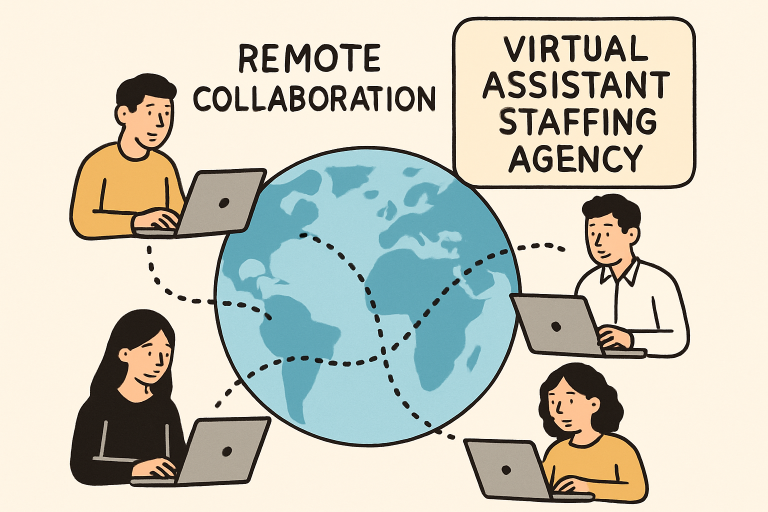Key Takeaways
- Access to a vetted, global network of skilled virtual assistants tailored to specific business requirements.
- Material cost savings by eliminating the need for office space, equipment, and full-time salaries.
- Enhanced productivity by allowing in-house teams to dedicate time to strategic projects rather than routine tasks.
- Agile workforce management with easy scalability to match evolving operational needs.
- Improved customer service capabilities via dedicated remote professionals.
Table of Contents
- Introduction
- Access to Global Talent
- Cost Savings
- Increased Productivity
- Flexibility and Scalability
- Enhanced Customer Service
- Choosing the Right Virtual Assistant Staffing Agency
- Implementing Virtual Assistants in Your Business
- Future Trends in Virtual Staffing
Introduction
In the modern business landscape, operational efficiency has become critical for company growth and sustainability. As organizations strive to adapt to fast-changing market demands, more are turning to virtual staffing support to drive productivity and streamline day-to-day management. Partnering with a virtual assistant staffing agency enables businesses to harness a specialized remote workforce, delivering vital skills and services while freeing core teams to focus on high-value initiatives.
Through this approach, companies gain access to global talent and achieve significant savings on labor costs and operational overheads. Virtual assistant staffing agencies make it simpler to match business needs with expert professionals who can handle everything from administrative work to customer service, without the expense and commitment of full-time employees. As more companies embrace digital transformation, leveraging virtual staffing support is a competitive advantage in a technology-driven world.
Access to Global Talent
Virtual assistant staffing agencies provide a gateway to a worldwide workforce, connecting businesses with professionals from diverse backgrounds. This global access allows companies to secure expertise in marketing, IT, accounting, or project management that may be hard to source locally. For example, a business needing fluent speakers for multilingual customer service can tap into talent in various time zones and languages, ensuring around-the-clock coverage and specialized knowledge that boosts overall business performance.
Cost Savings
Traditional hiring models for in-house teams typically involve substantial expenses beyond wages, such as insurance, office setup, payroll taxes, and equipment. Virtual assistants, on the other hand, are engaged remotely, and their services are often billed hourly or per project. This flexibility enables companies to allocate resources where most needed, rather than carrying the load of permanent staff costs. According to recent Forbes research, organizations leveraging remote teams can see significant reductions in operational fees, making this a cost-effective model for small businesses up to large enterprises.
Increased Productivity
Though necessary, routine administrative and back-office responsibilities often divert valuable time and focus from core business initiatives. Outsourcing these tasks to experienced virtual assistants allows their on-site teams to concentrate on higher-value activities such as strategic planning, innovation, and growth initiatives. Virtual assistants proficiently handle calendar management, email communication, travel arrangements, data entry, document formatting, and social media scheduling. This targeted delegation enhances workflow efficiency and maximizes in-house talent by freeing them from repetitive duties. The result is improved team productivity, faster project turnaround, and a more agile organization better equipped to meet evolving business demands.
Flexibility and Scalability
In today’s fast-paced business environment, companies often face shifting demands due to seasonal trends, special projects, or periods of rapid growth. Virtual assistant staffing agencies provide a flexible, on-demand workforce that can be scaled up or down as needed. This adaptability allows businesses to respond swiftly to changing workloads without the time-consuming burden of hiring or letting go of full-time staff. Whether temporary help for a product launch or consistent support for daily operations, virtual assistants can be quickly integrated into teams, ensuring continuity, cost-efficiency, and productivity, without the’ long-term commitment or overhead of traditional staffing methods.

Enhanced Customer Service
Customer expectations for fast, adequate support have risen dramatically in the digital age. Virtual assistants specializing in customer service roles respond to questions, track orders, resolve complaints, and gather feedback quickly. Maintaining open lines of communication and delivering human-centered service helps retain loyal customers and strengthens brand reputation. Research by the Financial Times notes that excellent customer service drives customer retention and positive business outcomes.
Choosing the Right Virtual Assistant Staffing Agency
The quality of your virtual team hinges on the agency you select. Look for partners with proven industry experience and deep talent pools relevant to your sector. Agencies should provide ongoing support, precise performance monitoring, and tools for effective management. Security protocols are also paramount—ensure your provider has robust systems to safeguard sensitive data and comply with relevant regulations.
- Experience and Specialization: Seek agencies familiar with your industry’s nuances.
- Support and Infrastructure: Evaluate their onboarding, training, and project management systems.
- Flexibility: Make sure service levels can flex with your workload.
- Security Measures: Confirm adherence to best practices in data security.
Implementing Virtual Assistants in Your Business
- Identify Tasks to Delegate: Begin by cataloging tasks that can be handled externally, such as scheduling, invoicing, or customer outreach.
- Select the Right Agency: Choose one whose culture and expertise align with your goals.
- Onboard and Train: Introduce the virtual assistant to key systems and processes, and clarify performance expectations.
- Utilize Collaboration Tools: Adopt communication platforms like Slack or project trackers like Trello to keep workflows smooth.
- Monitor Performance: Schedule regular evaluations to ensure the assistants deliver value and reach set goals.
Future Trends in Virtual Staffing
The future of virtual staffing will be defined by the increasing integration of artificial intelligence (AI), automation, and data-driven insights. AI-powered tools enable virtual assistants to automate repetitive tasks, analyze business trends, and suggest process optimizations. As remote work technologies evolve, collaboration, security, and workforce management platforms will become even more robust, allowing businesses to manage dispersed teams with greater confidence and agility. Forward-thinking companies that embrace these trends will be well-equipped to thrive in a rapidly changing global marketplace.
Ultimately, leveraging a virtual assistant staffing agency offers a solid path to improving flexibility, driving down costs, and building a workforce ready for the challenges of digital-era commerce.
You May Also Read: Fapello Unlocked: Your Ultimate Guide to Growth on This Innovative Platform










